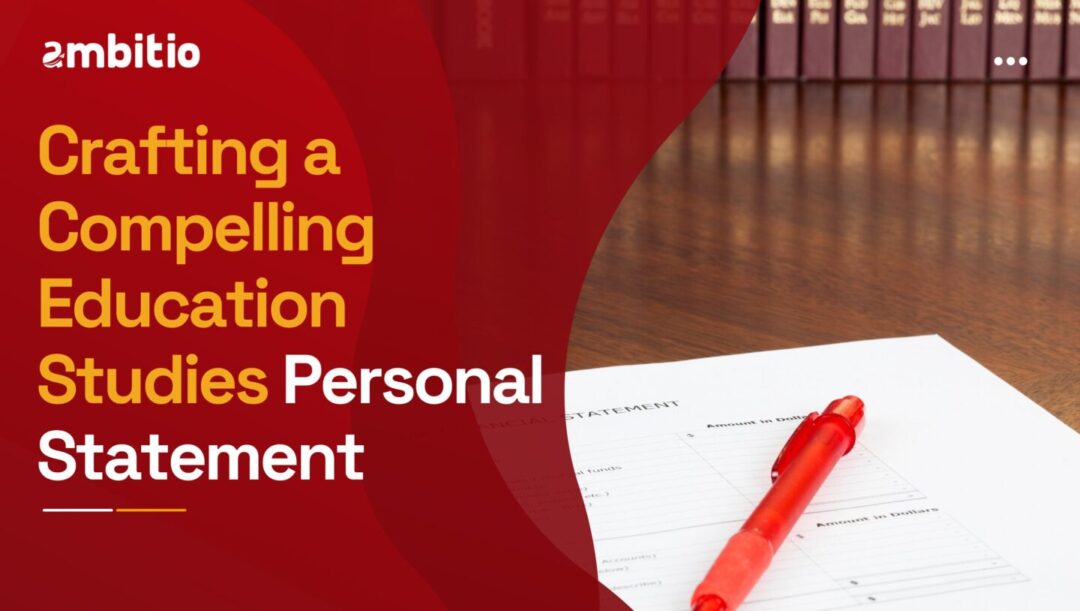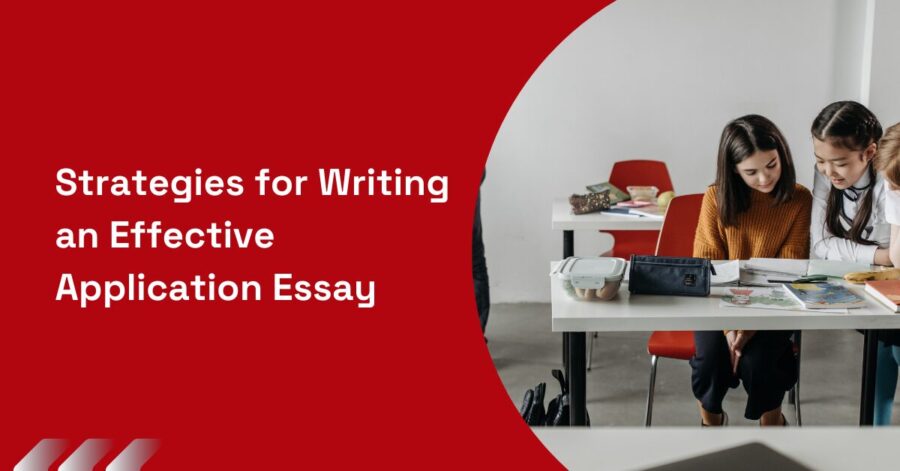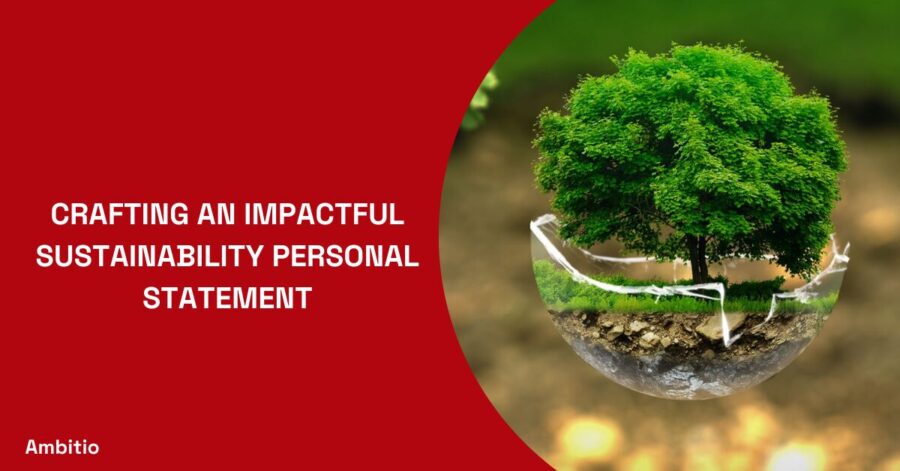1 September 2024
8 minutes read
Crafting a Compelling Education Studies Personal Statement: Key Strategies and Examples

Key Takeaways:
- Passion and Motivation: Clearly convey your passion for education and the motivations behind your career choice, using personal anecdotes or experiences.
- Experience Reflection: Reflect on and articulate the significance of your relevant experiences in education, whether through teaching, training, or other engagements with learners.
- Skills and Qualities Demonstration: Highlight the specific skills and personal qualities that make you suited for a career in education, providing concrete examples.
- Future Aspirations: Discuss your future career aspirations in education, showing how the program you are applying to aligns with these goals.
- Unique Perspective: Offer a unique perspective or insight into your educational philosophy or approach, distinguishing your statement from others.
When embarking on a journey in the field of education, your personal statement stands as a vital component of your application. This document isn’t merely a formality; it’s a personal narrative that outlines your enthusiasm, experiences, and qualifications. This comprehensive guide aims to assist you in creating an educational personal statement that is both engaging and reflective of your passion for teaching and learning.
The Significance of a Persuasive Personal Statement in Education
In education, a personal statement is your unique opportunity to illustrate your zeal for teaching. Whether you’re pursuing an undergraduate degree, a Postgraduate Certificate in Education (PGCE), or a postgraduate course, a meticulously crafted personal statement can significantly elevate your profile among other applicants.
Embarking on Your Personal Statement Journey
Understanding the Landscape
Before you begin writing, it’s crucial to understand what education programs and admissions tutors expect. They typically look for evidence of your commitment to teaching, your academic achievements, and your understanding of the challenges and rewards of a career in education.
Reflecting on Your Experiences
Your personal experiences are the cornerstone of your personal statement. Reflect on any teaching training, placements, or experiences working with children and how these experiences have cemented your decision to pursue a career in education.
Quick Tips:
- Engaging Introduction: Start with an engaging hook in your introduction to grab the reader’s attention and set the tone for your narrative.
- Concrete Examples: Use concrete examples to illustrate your points, making your experiences and attributes come alive for the reader.
- Tailored Content: Customize your personal statement for each application, ensuring it resonates with the specific program or institution’s ethos and objectives.
Structuring Your Education Personal Statement
Crafting a Strong Introduction
Your introduction should immediately capture the reader’s attention. Start with a compelling statement or anecdote that reflects your passion for education and sets the tone for the rest of your personal statement.
Developing the Body
In the body of your statement, delve into your academic background, highlighting any relevant coursework or projects. For postgraduate statements, focus on how your undergraduate studies have prepared you for more advanced education training.
Demonstrating Your Suitability
It’s important to discuss the skills and qualities that make you an ideal candidate for a teaching role. Highlight your communication skills, adaptability, and any practical experience in educational settings.
Concluding with Your Future Aspirations
Conclude your statement by reiterating your enthusiasm for education and outlining your career goals. This is your chance to leave a lasting impression on the admissions committee. Check some examples here.
Education Personal Statement Examples
As I sat in Mrs. Thompson’s vibrant third-grade classroom, surrounded by posters of famous mathematicians and colorful student artwork, I realized my calling. It was not just the mathematics on the blackboard that captivated me, but the way Mrs. Thompson engaged every student, weaving stories and challenges into lessons, making numbers come alive. That moment ignited my passion for education and set me on my path toward becoming an educator.
My journey through academia has been both challenging and enriching. At XYZ University, I pursued a Bachelor’s in Mathematics with a minor in Education, a combination that has allowed me to explore the theoretical intricacies of mathematics while understanding its practical application in teaching. Courses such as ‘Childhood Cognitive Development’ and ‘Curriculum Design’ have provided me with a solid foundation in educational theories and practices. Furthermore, my final year project, which focused on developing innovative strategies to teach algebra to middle school students, was a testament to my commitment to making education both accessible and engaging.
However, it is outside the lecture halls where my passion for teaching truly flourished. Volunteering as a tutor at the local community center, I worked with students from diverse backgrounds, facing various academic challenges. These experiences taught me the importance of adaptability and empathy in teaching. Witnessing the ‘aha’ moments of students as they grasped complex concepts was profoundly rewarding and reinforced my desire to pursue a career in education.
My dedication to teaching extends beyond the classroom. As the president of the University Math Club, I organized workshops and seminars aimed at promoting the love of mathematics among students. These events were not just about solving problems but fostering a community where learning was celebrated and fear of mathematics was diminished.
As I aspire to further my education with a Master’s in Education, my goal is to combine my strong foundation in mathematics with advanced pedagogical skills. I am particularly interested in XYZ University’s focus on STEM education and its commitment to innovative teaching methodologies. I am eager to delve into courses like ‘Technology Integration in Education’ and ‘Assessment and Evaluation’, which are crucial for my aspiration to become an educator who can effectively navigate the evolving landscape of education technology.
My ultimate aim is to make a positive impact in the field of education, just as Mrs. Thompson did for me. I envision a classroom where every student feels valued and is encouraged to explore their potential. I believe that my academic background, coupled with my hands-on experience and passion for teaching, aligns perfectly with the ethos of your program. I am excited about the opportunity to contribute to and learn from the esteemed faculty and diverse student community at XYZ University.
As I reflect on my journey so far, I am grateful for the experiences that have shaped my educational philosophy. I am ready to take the next step towards becoming an educator who inspires, challenges, and empowers students. Joining the Master’s in Education program at XYZ University would be a significant milestone in this journey, and I look forward to the opportunity to grow and contribute to the field of education.
Tips for Teacher Training Personal Statements
- Highlight Your Teaching Aspirations: Clearly articulate why you want to become a teacher. Discuss your passion for education and any specific experiences that inspired this career choice.
- Reflect on Relevant Experiences: Share any relevant experience you have in education, such as volunteering in schools, tutoring, or any formal teaching training you’ve completed. Explain how these experiences have prepared you for a career in teaching.
- Demonstrate Understanding of the Teaching Profession: Show that you have a realistic understanding of what a teaching career entails. Discuss the challenges and rewards of being a teacher, and how you are prepared to handle them.
- Showcase Your Subject Knowledge: If you’re applying for a subject-specific teaching program, highlight your expertise and passion for that subject. Explain how your academic background or work experience makes you well-suited to teach this subject.
- Incorporate Educational Theories or Philosophies: Mention any educational theories or philosophies that resonate with you and explain how they align with your teaching approach. This shows your depth of understanding and engagement with educational concepts.
- Discuss Skills and Qualities Essential for Teaching: Highlight key skills such as communication, organization, creativity, and empathy. Give examples of how you’ve demonstrated these skills in the past.
- Mention Any Extracurricular Involvements: If you’ve been involved in extracurricular activities, especially those related to teaching or mentoring, include these experiences. They can demonstrate your commitment and ability to engage with students outside the traditional classroom setting.
- Reflect on Classroom Observations or Placements: If you’ve had the opportunity to observe classes or participate in teaching placements, discuss what you learned from these experiences. Reflect on the teaching styles you observed and how they have influenced your own approach to teaching.
- Explain Your Choice of Institution or Program: Mention why you have chosen the specific teacher training program or institution. Discuss how their approach to teacher education aligns with your career goals and teaching philosophy.
- Articulate Your Long-Term Goals: Share your long-term career aspirations in the field of education. Whether it’s shaping future curriculum, contributing to educational policy, or inspiring a new generation of learners, convey a clear vision for your future.
- Personalize Your Statement: Make your personal statement uniquely yours by sharing personal anecdotes or experiences that have shaped your decision to pursue a career in teaching. This personal touch can make your statement more engaging and memorable.
- Proofread and Edit: Ensure your personal statement is well-written, free of grammatical errors, and within the required word limit. A well-crafted, clear, and concise statement can make a strong impression.
Realize your dream university admission with Ambitio Elite.
Harness the potential of personalized guidance, AI Copilot, and expert mentorship. Your academic journey begins here! Get Started with Ambitio Elite
Advanced Strategies for a Standout Personal Statement
- Start with a Captivating Hook: Begin your personal statement with an engaging opening that grabs the reader’s attention. This could be a poignant anecdote, a thought-provoking quote, or a unique personal experience that directly relates to your passion for the field of study.
- Tell a Compelling Story: Frame your experiences and academic journey as a narrative. This approach makes your statement more memorable and allows the admissions committee to see the evolution of your interest and commitment to your field of study.
- Demonstrate Reflective Insights: Go beyond just listing experiences. Reflect deeply on what you learned from them, how they shaped your understanding of the subject, and why they have propelled you towards this particular path.
- Incorporate Multidisciplinary Perspectives: If you have a diverse academic background or interests, show how these different areas intersect and enrich your understanding of your chosen field. This approach demonstrates intellectual curiosity and adaptability.
- Use Vivid, Descriptive Language: Employ descriptive language and vivid imagery to bring your experiences to life. This makes your statement more engaging and helps the reader visualize your journey.
- Show, Don’t Just Tell: Provide specific examples to demonstrate your skills, qualities, and achievements. This method is much more effective than simply stating that you possess certain attributes.
- Link Past Experiences with Future Goals: Clearly articulate how your past experiences have prepared you for this next step in your academic journey. Connect your past achievements and learning to your future goals and how the program you are applying for will help you achieve them.
- Address Any Gaps or Weaknesses Positively: If there are any gaps or apparent weaknesses in your academic record, address them positively. Explain what you learned from those experiences and how they contributed to your personal and academic growth.
- Incorporate Feedback from Trusted Sources: Seek feedback on your statement from mentors, advisors, or peers who understand your aspirations. Constructive feedback can provide new perspectives and insights to enhance your statement.
- Customize for Each Application: Tailor your statement for each application. Show that you have researched the institution or program thoroughly and explain why it is the right fit for your goals and interests.
- Highlight Unique Experiences or Qualities: Emphasize any unique experiences, qualities, or perspectives you bring to the table. This could include diverse cultural experiences, overcoming significant challenges, or unusual hobbies or skills that have shaped your worldview.
- Conclude with a Strong, Forward-Looking Statement: End your personal statement on a high note, summarizing your key points and expressing enthusiastic anticipation for the opportunity to further your studies and contribute to the field.
- Mind the Flow and Coherence: Ensure that your statement flows logically from one point to the next, maintaining coherence throughout. A well-structured statement facilitates a better reading experience.
- Polish and Perfect: Finally, polish your statement to perfection. Pay attention to grammar, syntax, and word choice. A well-written, error-free statement reflects your attention to detail and commitment to excellence.
Conclusion
Your education studies personal statement is more than a formal requirement; it’s a narrative that encapsulates your passion, qualifications, and vision for your future in the field of education. Invest time and thought into crafting a statement that authentically represents your aspirations as a future educator.
Get Tailored Advice on Your College Application: Your journey to the dream college starts here. Select a time for a call with our mentor and get custom solutions for your college application process.
FAQs
How crucial is it to include extracurricular activities in my personal statement?
Including extracurricular activities can significantly enhance your personal statement by demonstrating your commitment, diverse interests, and the ability to balance multiple responsibilities.
How can I make my personal statement stand out?
Personalize your statement with unique experiences, reflect on your motivation for choosing a career in education, and articulate your thoughts clearly and concisely. Using specific examples can also add depth to your narrative.
Should I mention specific educators or educational theories that inspire me?
Yes, mentioning educators or theories that have influenced your educational philosophy can add a layer of depth and insight into your understanding of the field.
How important is it to discuss my career goals in my personal statement?
Discussing your career goals is essential as it shows the admissions committee your long-term vision and commitment to the field of education.

You can study at top universities worldwide!
Get expert tips and tricks to get into top universities with a free expert session.
Book Your Free 30-Minute Session Now! Book a call now




























